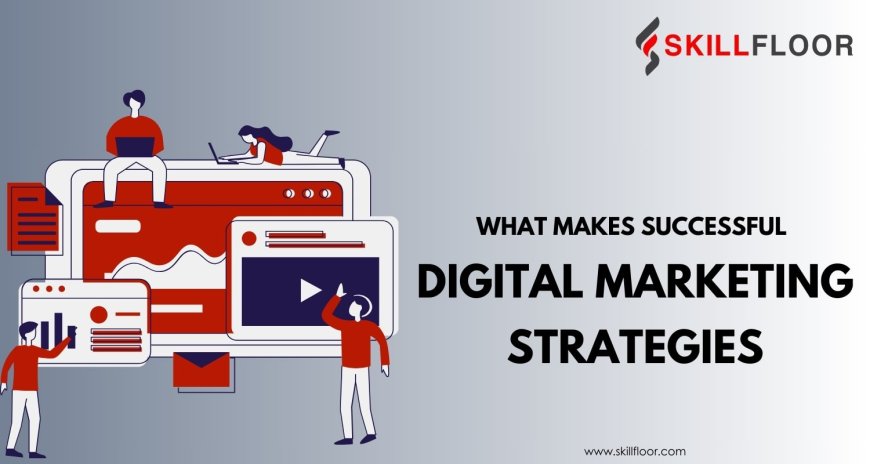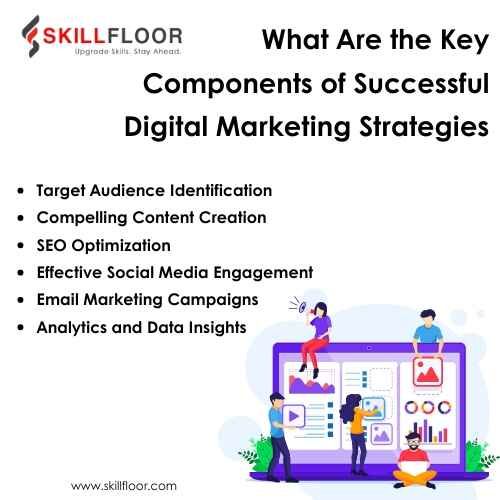What Makes Successful Digital Marketing Strategies
Discover key elements that define successful digital marketing strategies. Learn how to optimize campaigns effectively

Understanding effective Digital Marketing Strategies is crucial for long-term growth and visibility. Whether you're new to digital marketing or have experience, knowing the basics of Digital Marketing Strategies can greatly impact your success. At its core, Digital Marketing Strategies include various tools and techniques to maximize online presence and engagement. This ranges from using social media effectively to employing advanced Search Engine Optimization (SEO) methods. A Certified SEO Expert plays a vital role here, helping businesses improve online visibility and ensuring their content connects well with target audiences.
Successful Digital Marketing Strategies involve not just executing tactics but also planning. It requires staying updated with trends and technologies to keep marketing efforts effective in the digital world. Establishing a strong Digital Marketing Foundation is key. This helps businesses build deeper connections with their audience and achieve sustainable growth. This article explores the fundamental aspects of effective Digital Marketing Strategies. Understanding customer behavior and using data-driven insights are crucial parts of a comprehensive approach. Whether your goal is to boost brand visibility, increase conversions, or establish authority in your industry, mastering Digital Marketing Strategies is essential in today's competitive market.
Understanding Effective Digital Marketing Strategies
Knowing how to use digital marketing strategies effectively is crucial for businesses that want to succeed. Whether you're a Social Media Marketing Associate, SEO Associate, or Brand Reputation Manager, mastering these strategies is important. Digital marketing strategies include a wide range of techniques designed to improve your online presence and connect with customers. This includes things like making sure your website shows up in search engines, creating interesting content, managing social media accounts, and using paid ads. Successful strategies not only help more people find out about your business but also build trust in your brand and create long-lasting relationships with customers. By using analytics and keeping up with trends in your industry, you can improve your strategies and adapt to how people are shopping online.
Understanding these strategies helps you create effective marketing campaigns that connect with the people you want to reach and get real results. Whether you're working to make your brand more well-known or to get more people to buy things from your website, knowing about digital marketing strategies is important for success in today's business world.
Common Challenges in Implementing Effective Digital Marketing Strategies
Implementing effective digital marketing strategies can be difficult for businesses. Here are some common issues they face:
1. Understanding Audience Needs: Businesses must know who their audience is. Sometimes, they struggle to figure out exactly who their customers are, making it hard to target them properly.
2. Choosing the Right Channels: There are many digital platforms to choose from. It's tough for businesses to pick the best ones to use. They need to think about where their customers spend time online and how they interact with content.
3. Measuring ROI: Figuring out how much money they're making from their digital marketing efforts can be hard. Businesses often find it tough to know exactly how much their strategies are helping them make more sales.
4. Staying Updated with Trends: Digital marketing is always changing. New technologies and ways of doing things are always popping up. It can be hard for businesses to keep up and change their strategies when they need to.
5. Creating Engaging Content: Making content that people want to see is key to good digital marketing. But it's tough to keep making good stuff all the time and make sure it fits on all the different platforms.
To get around these issues, businesses need to plan carefully, keep learning new things, and use data to make their digital marketing strategies better over time.
What are the important factors for successful Digital Marketing Strategies?
1. Clear Goals: Set specific, measurable objectives for your campaigns.
2. Understanding Your Audience: Gain detailed insights into your customers and their needs.
3. Content Strategy: Plan engaging and relevant content for all your platforms.
4. SEO Practices: Optimize your content to improve search engine visibility.
5. Data-Driven Decisions: Use analytics to refine your strategies and get the best return on investment (ROI).
6. Multichannel Approach: Use different digital channels to keep your message consistent.
7. Brand Identity: Make sure your brand is recognizable and consistent in all your marketing.
8. Continuous Improvement: Regularly update and improve your strategies based on how well they perform.

Key Components of a Successful Digital Marketing Strategy
When it comes to digital marketing, creating a successful plan involves combining several important elements to achieve the best results. Here’s a breakdown of the main parts that make up a strong digital marketing strategy:
1. Clear Goals and Objectives: Start by setting specific goals that you can measure. These goals should match what you want for your business, like getting more people to know your brand, bringing more visitors to your website, or increasing sales. Having clear goals helps you shape your strategy effectively.
2. Identifying Your Target Audience: It's crucial to understand who your audience is. Do some research to find out their age, interests, and what they like to do online. This knowledge helps you create messages and campaigns that connect well with your audience.
3. Content Strategy: Content is at the core of digital marketing. Develop a plan for what content you'll create and where you'll share it—like blogs, social media posts, videos, and email newsletters. Posting regularly and making sure your content is valuable helps you engage your audience and build trust in your industry.
4. Search Engine Optimization (SEO): Improve how easy it is for people to find you online by using good SEO practices. This means using the right keywords, tags, and links in your content so that search engines show your website more often. Good SEO makes sure your content gets seen by the people who are looking for it.
5. Social Media Engagement: Use social media platforms to connect with your audience, build relationships, and promote your brand. Make a plan for how you'll use Facebook, Instagram, LinkedIn, and Twitter to meet your business goals.
6. Email Marketing: Keep in touch with potential customers and current clients by sending them targeted emails. Personalize your emails based on what your customers like to read, which helps them stay interested and makes them more likely to buy from you.
7. Pay-Per-Click (PPC) Advertising: Boost the traffic to your website by paying for ads on search engines and social media. These ads let you target specific groups of people based on things like age, location, and interests, which can help you get more customers quickly.
8. Analytics and Tracking: Keep an eye on how well your marketing efforts are working by using tools like Google Analytics. Watch things like how many people visit your website, how many buy something, and how much money your marketing makes you. Using this information helps you make your marketing better over time.
By using all these parts together in your digital marketing plan, you can make sure more people find your business online, get more people interested in what you do, and grow your business. For more tips on improving your digital marketing strategies, visit Skillfloor.
To succeed in digital marketing, you need to understand your audience well, create interesting content, and keep improving based on data. It's important to use different platforms effectively and be ready to change as technology and trends shift. This helps businesses improve their online presence and see real results. The key is to make sure your marketing matches your overall business goals and keeps customers interested.





























































